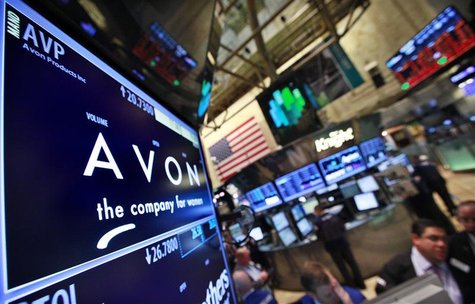Multinational bribery an issue in China
- By Duan Yaying
 0 Comment(s)
0 Comment(s) Print
Print E-mail China.org.cn, August 6, 2012
E-mail China.org.cn, August 6, 2012

The business corruption issue has come into full public view following the recent cosmetics giant Avon's bribery scandal. According to the Global Anti-Corruption Report 2008 published by anti-corruption watchdog Transparency International, rampant corruption, as a major global issue, is likely to incur an additional cost of US$50 billion in order to meet the development goals of a new millennium.
|
|
|
Avon Products Inc. said on Wednesday that it has held negotiations with the U.S. Justice Department and the Securities Exchange Commission (SEC), in the hopes of settling an investigation into the bribery of foreign officials. |
As a region that hosts frequent international business activities, China has created economic miracles, but has also fallen victim to commercial corruption to varying extent. China.org.cn here presents you with an overview of several multinationals charged with bribery in China.
|
Company |
HQ |
Industry |
Settling |
Case Briefings |
Self-Disclosure |
Penalties |
|
GE |
U.S. |
Airport Bomb-Detection Machines |
Feb. 14, 2005 |
From 2002 to 2004, InVision employees, sales agents and distributors made illegal payments to officials of government-owned airports in China, the Philippines and Thailand. The company paid US$95,000 in bribes in China. |
Y |
US$618,000 |
|
DPC |
U.S. |
Medical Equipment |
May 20, 2005 |
DPC Tianjin paid bribes to doctors of Chinese government-owned hospitals between 1991 and 2002. |
Y |
US$4.8 mln |
|
Schnitzer |
U.S. |
Steel Recycling |
Oct. 16, 2006 |
From 1999 to 2004, the former Chairman and CEO of Schnitzer Steel Industries approved cash payments and other gifts to officials at Chinese and South Korean government-owned steel mills. |
Y |
US$15.2 mln |
|
Paradim BV |
Netherlands |
IT |
Sept. 25, 2007 |
Paradim BV admitted to paying bribes in China, Indonesia, Kazakhstan, Mexico and Nigeria. |
Y |
US$1 mln |
|
York International |
U.S. |
Refrigeration Products |
Oct. 1, 2007 |
From 2001 to 2006, York International made illicit consultancy payments to government officials in China and several other countries. |
Y |
US$20 mln |
|
Lucent |
U.S. |
Telecom Equipment |
Dec. 21, 2007 |
From 2000 to 2003, Lucent paid the expenses for approximately 1,000 employees of Chinese state-owned enterprises to take approximately 315 trips to the United States. |
Y |
US$2.5 mln |
|
AGA |
U.S. |
Medical Equipment |
Jun. 3, 2008 |
From 1997 to 2005, AGA bribed Chinese government officials. |
Y |
US$2 mln |
|
Faro |
U.S. |
Software-based Measurement Devices |
Jun. 5, 2008 |
From 2004 to 2005, Faro's Chinese subsidiary made illegal payments to Chinese government officials. |
Y |
US$2.95 mln |
|
Siemens AG |
Germany |
Electronics and Electrical Engineering |
Dec. 15, 2008 |
Among the bribes Siemens paid on widespread global transactions, Siemens' Chinese subsidiary bribed Chinese government officials via a consultancy company to secure project contracts. |
N |
US$1.6 bln |
|
ITT |
U.S. |
High-Tech Engineering and Manufacturing |
Feb. 11, 2009 |
ITT was charged with making illicit payments to employees of state-owned enterprises through its wholly-owned Chinese subsidiary Nanjing Goulds Pumps Ltd.. |
Y |
US$1.67 mln |
|
Avery Dennison |
U.S. |
Pressure-Sensitive Adhesive Materials |
Jul. 28, 2009 |
Avery China bribed Chinese government officials and employees of Chinese state-owned enterprises between 2002 and 2005. |
Y |
US$200,000 |
|
Control Components Inc. |
U.S. |
Valves |
Jul. 31, 2009 |
CCI admitted to making an estimated 236 bribery payments to employees of related companies and government officials across 36 countries. These companies included PetroChina, China Petroleum Materials and Equipment Corporation, Dongfang Electric Corporation, China National Offshore Oil Corporation, China Resources Power and many other top Chinese state-owned companies. |
N/A |
US$18.2 mln |
|
UTStarcom |
U.S. |
Electronics and Electrical Engineering |
Dec. 31, 2009 |
UTStarcom's wholly-owned Chinese subsidiary paid nearly $7 million between 2002 and 2007 for 225 overseas trips taken by employees of Chinese government-controlled telecommunication companies that were customers of UTStarcom, all under the banner of customer training. UTStarcom provided 10 Chinese and Thai government customers, or their family members, with work visas and purportedly hired them to work for UTStarcom in the U.S., whereas in reality they did not work for the company. UTStarcom also paid more than $4 million for Chinese government customers to attend executive training programs at several U.S. universities and other training programs unrelated to UTStarcom's business. |
N/A |
US$3 mln |
(Source: U.S. Department of Justice and Securities and Exchange Commission's litigation releases)





Go to Forum >>0 Comment(s)